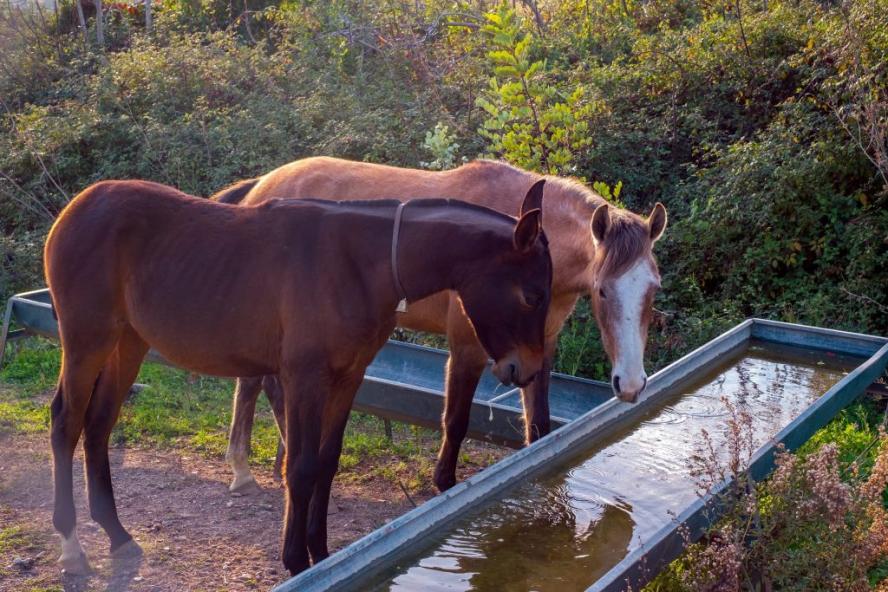-
About
- Leadership & Faculty
- News & Events
-
Academics
- Graduate
- Advanced Clinical Training
- Continuing Education
-
Student Life
-
-
Accommodations
- Our Campus
-
Accommodations
- Graduate Resources
-
-
Research
-
Hospitals & Clinics
- Emergency Care
- Hospital Services
-
Community Outreach
- Volunteer
The Time to Vaccinate Horses for EEE Is Now
Equine veterinarian says the region is likely in the middle of a three-year surge in the viral disease, which kills 90% of infected horses

By the time Tufts Veterinary Field Service arrived at the farm last August, it was too late for the unvaccinated horse. Sick with a high fever and unable to stand, it was diagnosed with eastern equine encephalitis (EEE)—or “Triple E”—a virus transmitted by mosquitoes that causes dangerous inflammation in the brain.
The horse died days later, a harbinger of the months to come. The United States—particularly the northeast—went on to experience its highest numbers of EEE since the 1950s.
Last fall, before COVID-19 shut down New England, EEE caused communities to cancel football games and other youth sports and public gatherings after dark. Although extremely rare, EEE is a serious public-health menace, killing a third of infected people and leaving many survivors with long-term neurological damage.
However, the illness is even worse for horses, said Cummings School clinical assistant professor Julia Wilkinson, V10. Nine out of 10 horses with EEE die, usually within two to three days of showing symptoms, she said.
“It’s a quick, hard-hitting disease,” said Wilkinson, an equine veterinarian with Tufts Veterinary Field Service.
Symptoms of EEE in horses typically start with high fever, a lack of appetite, lethargy, and depression and progress to neurologic signs including weakness, difficulty walking, seizures, and an inability to stand.
In 2019, the virus-infected eight horses in Massachusetts, six horses in Connecticut, two in New Hampshire, one in Rhode Island, and one in Maine, according to the Equine Disease Communication Center. Wilkinson noted that New England is likely in the middle of a three-year surge in the viral disease, which tends to flare up every ten years.
There is no treatment to cure EEE, said Wilkinson. Veterinarians only can offer infected horses supportive care—such as fluids, anti-inflammatory medications, and hospitalization with sling support for standing—as owners wait to see if they will pull through. As in human cases, surviving horses face serious neurological deficits.
Fortunately, an effective vaccine for horses exists for EEE, but not for people.
Although late May through July typically has been considered the ideal time to vaccinate horses to ward off the virus, which tends to peak in late summer and fall in New England, the apparent early emergence of EEE-positive mosquitoes this year makes it important to have horses vaccinated before June whenever possible.
(The EEE vaccine also may benefit alpacas and llamas, so Wilkinson encourages owners of these livestock animals to discuss vaccinations with their veterinarian.)
Although vaccination remains the first line of defense in preventing EEE infection in horses, Wilkinson urged animal owners to take all other precautions to protect themselves and to reduce the mosquito burden on their farm.
“Even though people can’t get EEE from a horse, they can get it from a mosquito,” she said.
“Clean watering troughs weekly, make sure you don’t have other sources of standing water on your property, apply insect repellant to yourself and your horse, and avoid time outdoors between dusk and dawn, when the mosquitoes that carry EEE are most active.”
Tufts Veterinary Field Service, which offered emergency and urgent care during the COVID-19 shutdown, is operating fully again with safety measures in place, including masks and physical distancing. Horse owners can now schedule preventative care visits, including EEE vaccinations, by calling 860-974-2780.
Department:
Tufts Veterinary Field Service